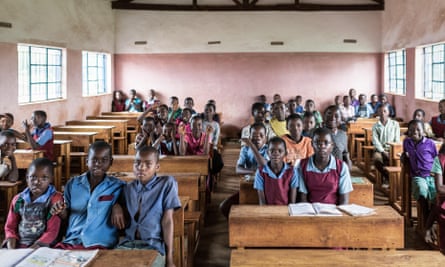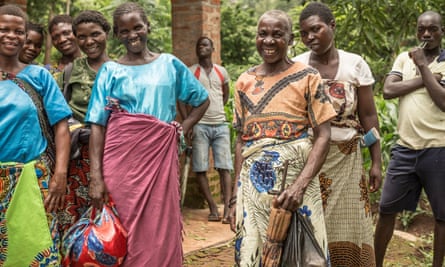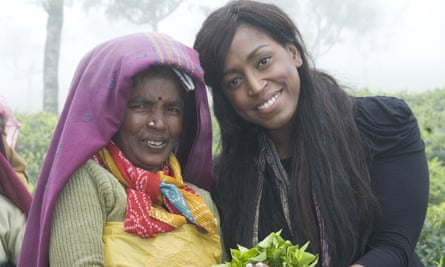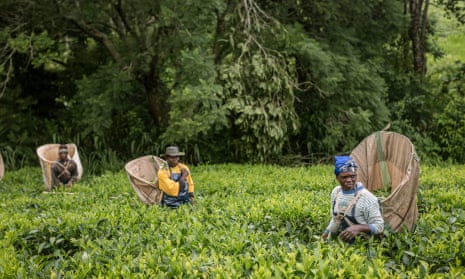When four Sainsbury’s executives met farmers from some of Africa’s biggest tea-growing co-operatives in a hotel in Nairobi last month it should have been a mutual celebration of Fairtrade, the gold standard of ethical trading and the world’s most trusted and best-known food certification scheme.
But instead of backslapping at the Pride hotel, the world’s largest retailer of Fairtrade products precipitated the greatest crisis in the scheme’s 25-year history by telling the 13 major tea groups and their 228,000 co-operative members that it intended to drop the globally known Fairtrade mark for their produce, and replace it with the phrase “fairly traded”.
In place of the strict rules devised by farmers’ groups working with independent development experts to guarantee consumers that small-scale farmers are being rewarded with decent pay and bonuses, the £23bn-a-year retailer said it planned to set up its own in-house certification scheme, set new ethical standards and introduce a different way to pay the groups.
From next week the company will no longer label its Gold, Red and other bestselling own-brand teas as “Fairtrade” but will call them “fairly traded”. Officially it is a pilot but the suspicion is that Sainsbury’s will then roll out the new standard across other products including bananas and coffee.
To add to the woes of the Fairtrade brand, it was revealed last week that Tesco will move all its own-label coffee from Fairtrade to another ethical certification scheme, the Rainforest Alliance. According to the Grocer, an industry magazine, this is likely to happen in 2018 and follows a similar announcement by the retailer earlier this year that it will do the same with its own-brand tea.
The farmers at the meeting with Sainsbury’s, mostly from Malawi, Rwanda and Kenya, were nonplussed. “Why change a system that has worked well for 25 years for both poor farmers and large supermarkets?” asked one. Had not the supermarket reaped tens of millions of pounds’ profit and huge moral kudos by pioneering Fairtrade and inviting customers to pay a bit more for their produce?
And in return for meeting Fairtrade’s high social, labour and environmental standards, the small farmers have also benefited to the tune of millions of pounds from the British consumer’s sense of fair play. “Has not everyone gained?” the tea farmers asked.
But the Nairobi meeting was significant because Sainsbury’s is just one of many large food and drink companies rethinking their supply chains, looking to cut costs and devising their own environmental and labour policies.
Because Sainsbury’s is so important for Fairtrade, the company’s move could be the beginning of the end of the scheme, and lead to lower social and labour standards, more hardship in developing countries and deep confusion among consumers, say some development and ethical trading groups.
“This move by Sainsbury’s represents a tip in the balance back to the powerful retailers,” says Sophi Tranchell, managing director of Divine Chocolate, the highly successful ethical trading company part-owned by tens of thousands of cocoa farmers in Ghana.

Fairtrade took off as an idea in the 1980s as awareness grew in Europe that small farmers in developing countries were being ripped off by a grossly unfair global commodity trading system which perpetuated poverty and penalised the poorest. In 1992, a group of Britain’s leading international charities, including Oxfam and the World Development Movement, picked up on a small Dutch initiative and set up the Fairtrade Foundation.
Twenty-five years later, the certification scheme, which guarantees a minimum price to farmers as well as a financial bonus, has grown from the commercial margins to the retail mainstream. Fairtrade, worldwide, is now a $2bn-a-year global operation, backed by governments, charities, churches, the Women’s Institute, A-list celebrities and supermarkets. In Britain, where it is most popular, nearly 80% of people are said to recognise its distinctive logo.
It has been an unlikely commercial success story, and a ray of optimism for millions of people concerned about inequalities between rich and poor countries and deteriorating human and labour rights.
“Fairtrade is growing worldwide, especially in south-east Asia and eastern Europe. It now benefits 1.6 million farmers worldwide, has 1,240 Fairtrade-certified producer organisations in 75 countries and last year a record £150m was sent as social premium payments to producer groups,” says Darío Soto Abril, the Colombian chief executive of the International Fairtrade organisation.
“The need to change a global food system that exploits both people and planet is greater now than ever,” says Abril. “There are new challenges. Climate change is making life harder for smallholder farmers, there is child exploitation, and many workers in developing countries are paid well below even the extreme poverty level. Fairtrade is changing to take these new challenges into account.”
Meanwhile, ethical trading that covers non-food items from clothing to crafts has grown steadily in Europe and the US and is now thought to be worth billions more pounds a year. Following boycotts of companies by activists and public pressure a variety of certification schemes have sprung up, which retailers are invited to join, for a price.
For a while the corporates were happy to pay and have their supply chains independently audited, but in recent years some of the biggest have decided to go it alone. High street chains including Costa, Starbucks and McDonald’s, and producers such as Unilever, M&S and Mondelez/Cadbury, have all devised their own schemes. But their standards vary enormously and consumers have to trust the companies.
The fractious Nairobi meeting made clear the despair felt by small farmers at the global trading system, in which supermarkets and shippers make big profits from importing raw produce from developing countries but barely anything goes to the farmers. It also showed how valuable a good ethical trading scheme can be for small farmers.
According to people at the meeting, the more the Sainsbury’s chiefs promised them contracts, advice and access to data, and told them the new in-house scheme would match their present income, the more worried they became.

Their fears centred on the “social premium”, the money that Fairtrade provides to farmers on top of the guaranteed minimum price they get for their produce. This money, which can be worth many thousands of pounds a year to big producer groups, goes straight to the farmers who agree to spend it on social schemes such as pensions, sick pay or education which they themselves choose and control.
The premium money, it emerged at the meeting, was in future going to have to be approved by a new Sainsbury’s foundation. “We feel betrayed. We are expected to cross our fingers and hope that Mr Sainsbury helps us. The power to give you money or not depends on them. It is good if they are planning to really help us but not at the cost of disempowering us,” said one man, who asked not to be named and who represents thousands of tea farmers. “We feel that our rights are being taken away from us, this feels like colonialism,” said a second at the meeting. “We want to be partners and friends. You want to control me. I don’t understand how a big retailer is chasing the premium going to poor people,” said a third.
Sainsbury’s apologised for giving the tea-growers such short notice of the changes it planned. But it has refused to consult further, and it is now feared that bananas, sugar, chocolate and dozens of other Fairtrade lines sold in the company’s 2,100 stores will eventually be withdrawn from Fairtrade as the company rolls out its own ethical trading scheme.
Last week Sainsbury’s senior executives insisted the new scheme was a pilot that would build on Fairtrade standards. “By providing farmers with advice, skills, resources, funding and opportunities alongside accountability, as well as listening and learning from them, we believe we can help empower them to secure a better quality life for themselves, their workers, families and broader communities,” said Judith Batchelar, director of brand at Sainsbury’s.
Companies setting up their own ethical trading schemes all say they want to improve workers’ conditions and pay. Some, such as Mondelez/Cadbury which pulled out of the Fairtrade scheme last year, have promised to invest over $400m in their cocoa supply chain, but it has been suggested that others are choosing cut-price schemes which do not guarantee better terms or more money.
Development groups question their motives. “Why would a company like Sainsbury’s that has been such a massive champion of Fairtrade decide to take the trusted mark off their tea products, and in the process take power and value away from small African producers who already have so little? At a time when sustainable development and human rights are going up the corporate agenda, it’s hard to follow the company’s reasoning,” said Rachel Wilshaw, Oxfam’s ethical trade manager.
Consumers, too, are confused. “How are we meant to know if these companies can be trusted? I only know the Fairtrade mark,” said Gillian Hargreaves, a shopper at a Sainsbury’s store in Oswestry, Shropshire, last week.
Sainsbury’s insists that its new approach will benefit farmers. But it now faces consumer boycotts and is under heavy fire from African tea producers and international development and trading groups.
A statement signed by Oxfam, Cafod, Christian Aid, the Women’s Institute and several major ethical trading and co-operative groups together representing millions of consumers, urged it to rethink its plans.
“The Fairtrade mark has become synonymous with ethical trade and quality for UK consumers. Sainsbury’s new scheme risks undermining all that has been achieved over the last 25 years. The standards are unclear, and farmers and producers may no longer be able to decide themselves directly how the money raised is spent to help their communities,” said the groups.
“The fear is that if Sainsbury’s launch their own ‘ethical’ line instead of using the Fairtrade model, other supermarkets might follow suit and consider ditching Fairtrade too,” said Oxfam.
But conversations with the farmers and Sainsbury’s suggest it has been planning to pull out of Fairtrade for two years – not only to improve farmers’ conditions, but also for financial reasons. Sales of Fairtrade products are said to be slipping and the company feels it is not getting value for the £60m which it says it has “invested” in ethical trading since 1994.
Although it sells nearly £200m of Fairtrade produce a year, overall company profits dropped 8% last year and in a fierce retail environment it now wants more credit for investing in poor farmers. It also suggests that it wants its money to be seen by the public to be better spent.

Sainsbury’s chief executive Mike Coupe is now on the defensive. “We most certainly don’t pretend to have all the answers – far from it – and that’s why this project is about testing and developing new approaches, collaborating with expert partners and listening to our farmers and producers – finding out what works, and what can be taken to scale and adopted to secure a sustainable supply chain that benefits both our suppliers and our customers,” he said.
“The principle of a company setting its own standards is fine, but the execution here is flawed,” said Mike Gidney, chief executive of the Fairtrade Foundation in London. The group is funded by the licences it issues to companies and stands to lose tens of thousands of pounds a year from Sainsbury’s withdrawal from tea – and far more if the retailer drops all its other lines.
“We have always been supportive of companies who want to set up in-house schemes and create their own standards. Mondelez are adding to what we have done, putting $400m into cocoa. Others, like Sainsbury’s, are substituting their own schemes and risk reversing the gains. Some independent schemes are good, but others are not.
“Sainsbury’s call it a pilot scheme, but it’s over no defined period. Where is the detail? Who will administer it? Does it have enough staff? This is unacceptable and we must draw a line. The suspicion must be that they are trying to save costs. The question is why have they changed for what may be an inferior scheme?”
Fairtrade is in real danger but it has come under fierce attack many times. Free-market thinktanks including the Institute of Economic Affairs, claim it is a barrier to free trade, which they say has led to many millions of people emerging from poverty. Academics have shown that it sometimes fails to improve the lives of very low-wage workers, and journalists have exposed how some companies and producer groups can abuse it.
But its biggest test is likely to be Brexit and the many new “free trade” deals which Britain, the US and others are expected to sign. New taxes on imports from the world’s poorest countries could cost small producers billions of dollars.
“Too often in the past, new trade deals have harmed not helped the poorest people. Leaving the EU’s single market and customs area without putting in place measures similar to the ones which currently protect farmers in the poorest developing countries would punish millions of farmers,” said Gidney.
He wants to keep talking with Sainsbury’s. “We are open to change. We want companies to own their supply chains and take responsibility for the social and environmental impacts they are having. There is no single route to a better trading system. We will survive this. We have to work together.”

Comments (…)
Sign in or create your Guardian account to join the discussion